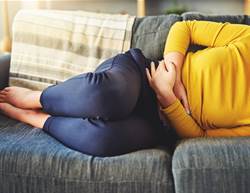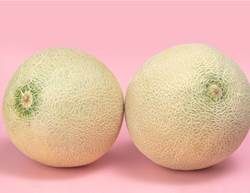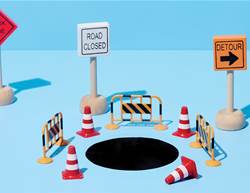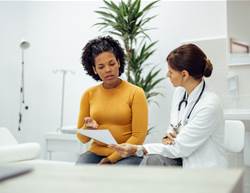It’s that time of the month and you’re feeling rough. You sigh, take some painkillers and get on with your week. Up to 90% of women report period pain. But many of us see it as normal, even when it causes disruption to our life.
The pain can be felt in the lower abdomen (belly), but sometimes it’s felt in the lower back and thighs. It can feel like a constant ache, a heaviness, or a cramping, gripping pain, says Jean Hailes.
If you have severe period pain, it could be due to an underlying condition like endometriosis, adenomyosis or fibroids.
Gynaecologist Dr Peta Wright says we don’t have to put up with period pain.
Women are “often not aware of many other factors at play that are well within their own control,” she says.
Here, we include an edited extract of her book, Healing Pelvic Pain on period pain relief.
Why are periods painful?
A period is an inflammatory process and most women experience some discomfort or pain for a few days before and during the first days of bleeding. Excess inflammation can cause more pain, as can our nervous system state, our pelvic floor and our gut health.
An abnormally painful period is a sign from our body that we need to look at everything else that can be increasing inflammation or dialling up our nervous system state.
Think about the quality of your period as a report card on the health of the rest of your body, as Dr Lara Briden says in her book Period Repair Manual. Or like a warning light flashing on your car dashboard, telling you that you need to check under the hood. You’re grateful for the warning light because it lets you address the problem promptly rather than getting halfway down the highway and grinding to a halt with smoke billowing from the bonnet.
A Mediterranean anti-inflammatory diet
A general recipe for a healthy and easeful period is the same as that for a healthy body. While there is no conclusive evidence that one way of eating is better for women with painful periods than another, the quality of our diet does impact our gut microbiome and gut lining.
A wholefood Mediterranean diet has the best evidence for reducing inflammation and, unsurprisingly, it has the best evidence for good health, including a healthy gut microbiota. As endometriosis, pain and IBS have all been linked to an altered gut microbiome – diet is important.
Your best bet is to focus on an anti-inflammatory diet high in fibre and prebiotics (which feed the microbiome), polyphenols and good fats such as those in olive oil, and low in trans fats, refined sugar and large amounts of processed, factory-farmed or grain-fed red meat. This advice is applicable to everyone on the planet. In general, our poor, overly processed Western diet laden with simple carbohydrates, sugar and inflammatory fats has played a huge part in the skyrocketing rates of chronic disease. Because our periods and menstrual cycle cannot be separated from the rest of our body, high overall bodily inflammation can show up as more painful periods.
Learn more about the Mediterranean diet.
Lifestyle changes
There’s no direct evidence that lifestyle changes help women with period pain or endometriosis (because minimal studies have been done), but they make a huge difference to our patients every day. We know that having a healthy lifestyle helps our nervous system feel safe and also promotes a healthy immune system to reduce inflammation.
Particularly important parts of the lifestyle prescription to set you up for a healthy period are:
Physical activity
I recommend moving your body every day in a way that feels good to you. Tuning in to your body as its physiology changes throughout the menstrual cycle and adjusting the type of exercise is important. It’s okay to slow down during your menstrual phase, but some form of gentle movement always helps decrease inflammation, release tight muscles and increase pain-reducing endorphins.
Good sleep
Getting seven to eight hours of sleep a night is incredibly important for immune function. It’s also known to decrease cortisol and insulin, which results in lower inflammation and lower pain.
This means:
- going to bed mostly around the same time every night
- minimising the use of screens close to bedtime
- introducing a nightly bedtime routine that allows you to wind down
- having a bath or shower
- doing some gentle yoga, stretches, meditation or breath work before your head hits the pillow.
This all helps promote the release of melatonin – which we need to help us feel sleepy and acts as an antioxidant in the body.
Living cyclically
Try making room in your life for your body to rest when you have your period.
Stress management
Chronically elevated cortisol can alter the gut microbiome, impair the gut lining, increase immune dysregulation and worsen other gut symptoms. Chronic stress increases the production of inflammatory cytokines and pelvic floor tension, and primes pain pathways to learn chronic pain.
Medication
Hormonal drugs like the combined oral contraceptive pill. This enables women to stay on continuous hormone pills and ‘skip’ their periods. Speak to your doctor if this is the right option for you.
Self-care and natural therapies
It’s important to address period pain early to avoid upregulation of pain pathways. If self-care and simple measures such as diet, heat and gentle movement are not effective, I would start with some anti-inflammatory herbs and supplements followed by over-the-counter medications.
Overuse of non-steroidal medication like ibuprofen and Ponstan can worsen gut symptoms and contribute to IBS and leaky gut, so I would usually recommend the following first:
- Heat packs and warm baths
- Movement like gentle yoga and walking.
- Allowing yourself space to take things more slowly
- Ginger root capsules. Numerous studies have shown these to be as effective as ibuprofen and Ponstan for period pain. Ginger tea is another option.
If periods are still painful, you could move on to ibuprofen and paracetamol taken regularly.
Being aware of your lifestyle throughout the month helps set you up for an easy period and reinforces the idea that the way we experience our periods is a reflection of our underlying general health.
Promising supplements
As part of a holistic treatment approach, some women may find certain supplements beneficial. Large studies looking at the effectiveness of supplements are limited, but some that show promise include:
- Curcumin (turmeric), which in endometriosis lesions accelerates healthy cell death, suppresses local production of oestrogen and inhibits formation of new blood vessels.
- Zinc, which repairs intestinal permeability to help normalize immune function, is anti-inflammatory and helps to relieve pain.
- NAC (N-acetyl cysteine amino acid), an antioxidant and immune regulator that can help reduce inflammation and pain.
- Magnesium, taken daily or with periods, it has been shown in some studies to be more effective than a placebo at improving period pain. It works to reduce inflammation. I recommend magnesium glycinate because magnesium citrate can cause digestive problems in some women.
- Fish oil (omega-3), which reduces inflammation.
- Vitamin D, several studies have shown if a blood test reveals low vitamin D levels, vitamin D supplements may improve period pain
- Probiotics, which are helpful in restoring a healthy gut biome and reducing gut symptoms and pelvic pain.
These changes on their own may not be enough
While a healthy diet, supplements, herbal treatments and even taking hormonal drugs have their place and can often make a big difference to women suffering with pelvic pain.
If you have painful periods and find that your pain is still severe, debilitating or persistent after trying these simple strategies, something is wrong and you shouldn’t ignore it. Persistent pain is always a sign that something is amiss, so you need to listen to it and get to the root of what it’s trying to tell you.
If period pain is affecting your everyday life, ask your doctor if it could be due to an underlying condition.










